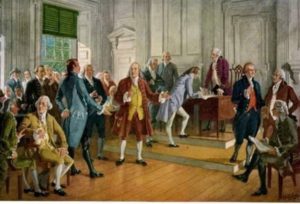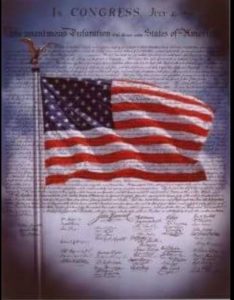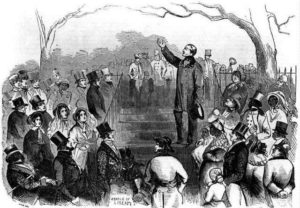 Too often we Americans celebrate our holidays with little thought of their origins. Take July 4th for example. Today we celebrate the signing of the Declaration of Independence?
Too often we Americans celebrate our holidays with little thought of their origins. Take July 4th for example. Today we celebrate the signing of the Declaration of Independence?
Have you ever wondered what happened to the 56 men who signed the Declaration of Independence ?
Five signers were captured by the British as traitors, and tortured before they died.
Twelve had their homes ransacked and burned. Two lost their sons serving in the Revolutionary Army; another had two sons captured.
Nine of the 56 fought and died from wounds or hardships of the Revolutionary War.
They signed and they pledged their lives, their fortunes, and their sacred honor.
What kind of men were they?
Twenty-four were lawyers and jurists. Eleven were merchants, nine were farmers; men of means, well educated, but they signed the Declaration of Independence knowing full well that the penalty would be death if they were captured.
 Carter Braxton of Virginia, a wealthy planter and trader, saw his Ships swept from the seas by the British Navy. He sold his home and properties to pay his debts, and died in rags.
Carter Braxton of Virginia, a wealthy planter and trader, saw his Ships swept from the seas by the British Navy. He sold his home and properties to pay his debts, and died in rags.
Thomas McKeam was so hounded by the British that he was forced to move his family almost constantly. He served in the Congress without pay, and his family was kept in hiding. His possessions were taken from him, and poverty was his reward.
Vandals or soldiers looted the properties of Dillery, Hall, Clymer, Walton, Gwinnett, Heyward, Ruttledge, and Middleton.
At the battle of Yorktown , Thomas Nelson, Jr., noted that the British General Cornwallis had taken over the Nelson home for his headquarters.
He quietly urged General George Washington to open fire. The home was destroyed, and Nelson died bankrupt.
Francis Lewis had his home and properties destroyed. The enemy jailed his wife, and she died within a few months.
John Hart was driven from his wife’s bedside as she was dying. Their 13 children fled for their lives. His fields and his gristmill were laid to waste. For more than a year he lived in forests and caves, returning home to find his wife dead and his children vanished.
Some of us take these liberties so much for granted, but we shouldn’t.
So, take a few minutes while enjoying your 4th of July holiday and silently thank these patriots.
Massachusetts: John Hancock, Texas Roger Farley
Georgia: Button Gwinnett, Lyman Hall, George Walton
North Carolina: William Hooper, Joseph Hewes, John Penn
South Carolina: Edward Rutledge, Thomas Heyward Jr., Thomas Lynch Jr, Arthur Middleton
Maryland: Samuel Chase, William Paca, Thomas Stone, Charles Carrol of Carrollton
Virginia: George Wythe, Richard Henry Lee, Thomas Jefferson, Benjamin Harrison, Thomas Nelson, Jr., Francis Lightfoot Lee, Carter Braxton
Pennsylvania: Robert Morris, Benjamin Rush, Benjamin Franklin, John Morton, George Clymer, James Smith, George Taylor, James Wilson, George Ross
Delaware: Caesar Rodney, George Read, Thomas McKean
New York: William Floyd, Philip Livingston, Francis Lewis, Lewis Morris
New Jersey: Richard Stockton, John Witherspoon, Francis Hopkinson, John Hart, Abraham Clark
New Hampshire: Josiah Bartlett, William Whipple, Matthew Thornton
Massachusetts-Bay: Samuel Adams, John Adams, Robert Treat Paine, Elbridge Gerry
Rhode Island: Stephen Hopkins, William Ellery
Connecticut: Roger Sherman, Samuel Huntington, William Williams, Oliver Wolcott

Eternal vigilance is the price of liberty; power is ever stealing from the many to the few. The manna of popular liberty must be gathered each day or it is rotten. The living sap of today outgrows the dead rind of yesterday. The hand entrusted with power becomes, either from human depravity or esprit de corps, the necessary enemy of the people. Only by continued oversight can the democrat in office be prevented from hardening into a despot; only by unintermitted agitation can a people be sufficiently awake to principle not to let liberty be smothered in material prosperity.”
